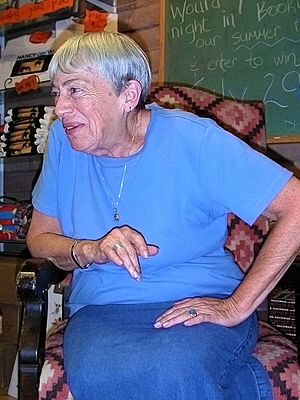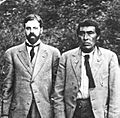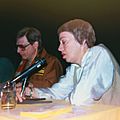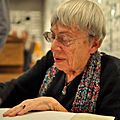Ursula K. Le Guin facts for kids
Quick facts for kids
Ursula Kroeber Le Guin
|
|
|---|---|

Ursula K. Le Guin at an informal bookstore Q&A session, July 2004
|
|
| Born | October 21, 1929 |
| Died | January 22, 2018 (aged 88) Portland, Oregon, United States |
| Occupation | Novelist |
| Nationality | American |
| Genre | Science fiction fantasy |
| Website | |
| http://www.ursulakleguin.com | |
Ursula Kroeber Le Guin (pronounced /ˈɝsələ ˈkroʊbɚ ləˈgwɪn/) (October 21, 1929 – January 22, 2018) was an American writer. She wrote many different kinds of books. These included poetry, children's books, essays, short stories, fantasy and science fiction. She is famous for her amazing stories that make you think.
About Ursula K. Le Guin
Her Early Life in California
Ursula Kroeber Le Guin was born in Berkeley, California. Her birthday was October 21, 1929. Her father, Alfred L. Kroeber, was an anthropologist. This means he studied human societies and cultures. He worked at the University of California, Berkeley.
Ursula's mother, Theodora Kroeber, also went to college. She became a successful writer later in life. Her most famous book was Ishi in Two Worlds. It was about Ishi, who was the last known member of the Yahi tribe.
Ursula had three older brothers. Her family had many books. Ursula and her brothers loved to read when they were young. Many interesting people visited their home. Some were famous thinkers, like J. Robert Oppenheimer. Le Guin even used Oppenheimer as an idea for a character in her book The Dispossessed. The family lived in a summer home in the Napa Valley. They lived in Berkeley during the school year.
Her Education and Studies
Le Guin went to Berkeley High School. She then studied at Radcliffe College. In 1951, she earned a degree in French and Italian literature. She was a very good student.
After that, Le Guin went to Columbia University. She earned a master's degree in French in 1952. She planned to get a higher degree called a Ph.D. She even won a special scholarship, called a Fulbright grant. This allowed her to study in France from 1953 to 1954.
Meeting Her Husband in France
In 1953, Ursula traveled to France on a ship called the Queen Mary. On this trip, she met a historian named Charles Le Guin.
Marriage and Family Life
Ursula and Charles got married in Paris in December 1953. Ursula decided not to finish her Ph.D. after getting married. While her husband finished his own studies, Ursula taught French. She also worked as a secretary.
Their first daughter, Elisabeth, was born in 1957. They had another daughter, Caroline. Later, their son Theodore was born in Portland in 1964.
Moving to Portland, Oregon
In 1959, Charles became a history teacher at Portland State University. The family moved to Portland, Oregon. They lived there for the rest of their lives. Ursula also received more Fulbright grants. These allowed her to travel to London in 1968 and 1975.
Her Amazing Writing Career
Ursula K. Le Guin started writing in the 1960s. She won many important awards for her books. These included the Hugo Award and Nebula Award. She won the Gandalf Grand Master award in 1979. In 2003, she received the Science Fiction and Fantasy Writers of America Grand Master Award.
She won eighteen Locus Awards, which is more than any other writer! Her book The Farthest Shore won the National Book Award for Children's Books in 1973.
In 2000, the Library of Congress gave her a "Living Legends" award. This was for her important contributions to American culture. She was truly a legendary writer.
Her Passing Away
Ursula K. Le Guin died on January 22, 2018. She was 88 years old and passed away at her home in Portland. Her son said she had been sick for a few months. He thought she might have had a heart attack. Many writers, like Margaret Atwood, spoke at a public memorial service for her in June 2018.
Ursula's Beliefs and Values
Standing Up for Freedom
In 1975, Le Guin won a Nebula Award for her story "The Diary of the Rose." But she did not accept the award. She was protesting against the Science Fiction and Fantasy Writers of America. This group had removed a writer named Stanisław Lem from their membership.
Le Guin believed they removed Lem because he criticized American science fiction. She felt it was wrong to punish someone for their opinions. She said she could not accept an award for a story about an unfree society from a group that did not protect freedom of speech.
Her Thoughts on Religion
Le Guin grew up without any specific religious teaching. However, she became very interested in Taoism and Buddhism. She said that Taoism helped her understand her life as a teenager and young adult. In 1997, she even published her own translation of the Tao Te Ching, an important Taoist book.
Protecting Authors' Rights
In 2009, Le Guin quit a group called the Authors Guild. She did this to protest their agreement with Google Books. Google was scanning many books. Le Guin felt the Guild gave away control of authors' rights too easily.
In 2014, she gave a speech at the National Book Awards. She talked about how Amazon had too much power over the book publishing world. She was worried about how Amazon blocked books from the Hachette Book Group during a disagreement. Her speech was shared widely around the world.
Her Books
The Earthsea Fantasy Series
Ursula K. Le Guin is very famous for her Earthsea books. These are fantasy stories.
- A Wizard of Earthsea, 1968
- The Tombs of Atuan, 1971
- The Farthest Shore, 1972 (This book won the National Book Award)
- Tehanu: The Last Book of Earthsea, 1990 (This book won the Nebula Award)
- The Other Wind, 2001
She also wrote a collection of short stories called Tales from Earthsea in 2001.
The Hainish Cycle Science Fiction Series
Le Guin also wrote the Hainish Cycle books. These are science fiction stories.
- Rocannon's World, 1966
- Planet of Exile, 1966
- City of Illusions, 1967
- The Left Hand of Darkness, 1969 (This book won both the Hugo Award and Nebula Award)
- The Dispossessed: An Ambiguous Utopia, 1974 (This book also won both the Hugo Award and Nebula Award)
- The Word for World is Forest, 1976 (This book won the Hugo Award)
- Four Ways to Forgiveness, 1995 (Four Stories of the Ekumen)
- The Telling, 2000 (This book won the Endeavour Award)
Other Novels and Story Collections
- The Lathe of Heaven, 1971 (This book was made into TV movies)
- The Eye of the Heron, 1978
- Malafrena, 1979
- The Beginning Place, 1980
- Always Coming Home, 1985
- Lavinia, 2008
The Catwings Collection
These are children's books about cats with wings!
- Catwings, 1988
- Catwings Return, 1989
- Wonderful Alexander and the Catwings, 1994
- Jane on her Own, 1999
Nonfiction Books
Le Guin also wrote books that were not fiction. These included essays and thoughts on writing.
- The Language of the Night, 1979
- Dancing at the Edge of the World, 1989
- Steering the Craft, 1998 (This book is about how to write)
- The Wave in the Mind, 2004
Images for kids
-
Ursula's father, Alfred Kroeber, with Ishi, the last of the Yahi people (1911)
-
Le Guin with Harlan Ellison at Westercon in Portland, Oregon (1984)
-
Le Guin at a reading in Danville, California (June 2008)
See also
 In Spanish: Ursula K. Le Guin para niños
In Spanish: Ursula K. Le Guin para niños






